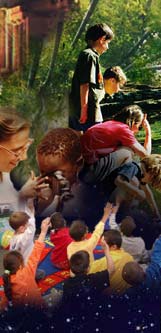|
LESSONS

©PRISMATICUM is an adaptive, integrated approach
to teaching and learning which links knowledge across school disciplines
through an interdisciplinary theme, helping learners to better understand
real-life situations in a school setting. Colors of the divided
spectrum (school subjects) pass through the transforming prism (the
theme), and exit as focused light (the conceptual understanding
of the issues).
[ Socrates
Main Menu] [ Vision
Menu ]
[ Festival Menu
]
Justification for an Interdisciplinary Education
by Mary L. Radnofsky, Ph.D.
In the workplace or at home, we would no
more break down our lives into isolated subjects, with a bit of
math in the morning, a touch of science after lunch, a few minutes
of history, and some grammar drills to wrap up the day.
We would no more reduce a game of baseball to
one inning of math, the next of science, the third of language arts
and on and on. Instead, when we play the game, and we're at bat,
for example, we gauge distance, speed, and velocity of a pitch;
we consider the probability of a curve ball; we note the wind and
its direction, the angle of the sun, the placement of the outfielders
and other players on base; we look for signals being communicated
from the coach; we go through a series of rituals and dance steps
to let the pitcher know whether we're ready for the ball --- all
in a matter of seconds. Then we take our stance, concentrate on
the pitcher's movement and focus. As we take it in, we use all our
understanding to hit the ball as it's pitched, and after we make
contact, the ball is flying and the adrenalin is pumping, we run
like crazy!!!
What is happening here should be no different
from the way we approach playing the game of life and ganing the
education we need in order to be able to pleay it well..
Why not take a significant and appropriate issue
which naturally requires learning in several specialized subject
matters? The theme of "Time" or "Vision" are
good examples. Such a theme can easily be applied to multiple lessons
across the curriculum, and it requires thinking about both its literal
and figurative meanings.
To understand such a topic, even for beginners,
is to grasp some of the basic concepts and patterns of humanity,
culture, and civilization. To place it at the center of an educational
program is to challenge and pique the curiosity of learners, increasing
their chances of staying in school and gaining the kind of education
that will best serve them as they grow up.
Let's look at one theme more closely: Take "Vision"
as a theme:
We can first look at the very concrete tools of
science that give us vision, and allow us to see: the human eye,
the eyes of different animals, microscopes, telescopes.
We can then transfer the notion of seeing to imagining:
how is a writer's vision of a setting or a character developed in
works of literature? Is seeing the same as understanding? What is
worth our focus?
All throughout the course, we can study the thought
processes of great visionaries, explorers, discoverers, and inventors
as they proceeded in their various fields. By identifying some of
their habits of mind, we can teach them to our children - Look at
scientists, civil rights leaders, artists, philosophers, doctors,
astronauts, athletes, the physically-challenged, musicians, etc.
As we look at the works of great visionaries,
we can also see how their role in history shaped society today.
Then history comes alive as we walk in their shoes, understand their
century, their wars, their daily activities, their families, their
pasttimes, their legacies, etc.
When we explore a given theme in such depth, we
realize that there are concepts beyond the scope of traditional
school subjects which naturally arise. Complex social issues and
matters of human relationships, already part of the school experience,
can purposefully be studied through the academic subjects. This
allows students excellent opportunities to articulate their own
kiinds of visions or perspectives, and to begin to recognize the
difference between mere opinion and well-reasoned judgement.
Why Think Interdisciplinary?
BECAUSE...
Real-world problems
are complex & require multifaceted solutions
Creativity,
discovery, & innovation come from uniting knowledge in new
ways
Complex,
interdisciplinary themes pique students' curiosity & hold
their interest
Meaningful
learning experiences increase students' chances of staying in
school
Interdisciplinary
projects cultivate the transfer of critical thinking -- in &
out of school
HOW CAN WE
LEARN TO THINK AND SEE INTERDISCIPLINARILY?
The Socrates Institute creates
an environment in which groups of participants are motivated and
encouraged to work on complex ideas together.
Groups learn how to observe a setting, describe relationships
between people and phenomena, and ask probing questions which
will guide them through the problem-defining and problem-solving
processes.
Creative thinking in ways previously
unexplored is emphasized, using strategies adapted from field-tested
ethnographic studies.
Qualitative methods for triangulation and for developing theories
are among the strategies preferred.
Prismaticum© is used to visualize and clarify the relevant
concepts which emerge from these processes, and to facilitate
the practical application of interdisciplinary programs in schools
classrooms and other instructional settings.
[
Socrates
Main Menu]
[ Vision Menu
]
[ Festival Menu
]

CyberEthics Project
|

